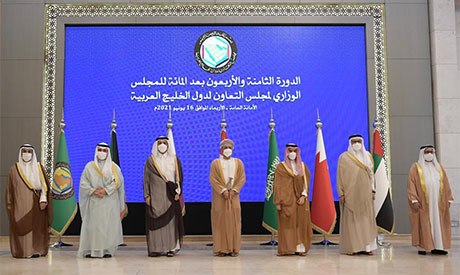
Foreign ministers of Saudi Arabia, Kuwait, the United Arab Emirates, Qatar, Bahrain, and Oman of the Gulf Cooperation Council (GCC) after the meeting on Wednesday, June 16, 2021. Photo courtesy of Gulf Cooperation Council Twitter account
The Gulf Cooperation Council (GCC) stressed the priority of Egypt and Sudan’s water security amid the Grand Ethiopian Renaissance Dam (GERD) crisis with Ethiopia.
The foreign ministers of Saudi Arabia, Kuwait, the United Arab Emirates, Qatar, Bahrain, and Oman welcomed during the 48th ministerial meeting a resolution by the Arab League that affirmed the rejection of any unilateral measures that could undermine the rights of Egypt and Sudan in the Nile.
The GCC ministers asserted their support to all efforts aiming to reach a resolution that would take into account the interests of all involved parties and the importance of continued negotiations to reach a fair accord as soon as possible
Wednesday’s statement by the six-member council comes one day after the Arab League said, following an extraordinary meeting by Arab foreign ministers over the dam crisis in Doha, that Egypt and Sudan’s water security was an integral part of Arab national security.
In a resolution on Tuesday, the Arab League stressed its rejection of any measures that would undermine the water share of Egypt and Sudan, in reference to Ethiopia’s planned second filling of the dam in July despite the lack of an agreement between the three countries on its filling and operation.
It has also called for the United Nations Security Council (UNSC) to intervene in the crisis, which risks aggravating tensions in the region.
Egypt and Sudan have been negotiating for almost a decade now with Ethiopia to reach a legally binding and comprehensive deal on the GERD’s construction, which Addis Ababa started to build on the Blue Nile in 2011.
Ethiopia’s rejection of several proposals by Egypt and Sudan on the negotiation mechanism, which includes mediation by an international quartet, has led to the collapse of the Kinshasa talks sponsored by the AU in April.
Egypt’s 100 million-plus population depends on the Nile for over 95 percent of its fresh water.
Sudan fears the GERD will put the operation of its Roseires dam and the lives of 20 million Sudanese citizens at “a very high risk” if an agreement regulating the operation and filling of GERD is not reached before the second filling.
Short link: